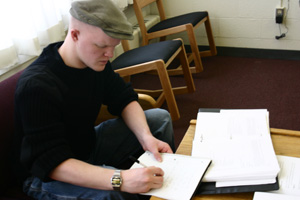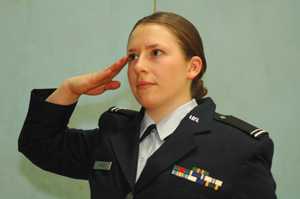As an enlisted member of the United States Air Force, Ithaca College junior Eric Webster knows how to handle an attack on the battlefield. But he never thought he would have to use his war and defense skills inside the classroom.

In his Media and Politics course last fall, Webster said, he spent the majority of class time defending his beliefs from the verbal challenges of his classmates.
“I knew that I was most likely the only outspoken conservative in that class before I signed up for it, and I didn’t have a problem with that,” Webster said. “But I found that every time I said something, before I had finished speaking, five hands go up in a response to me.”
Webster is serving a six-year term at the 107th Air Refueling Wing in
Niagara Falls, N.Y., where he has worked as an occupation specialist with military officers on his base’s computer network since 2003. After reading and analyzing intelligence reports, Webster summarizes information for pilots and commanders.
Webster said disrespect of his opinions and his classmates’ hesitation to accept his political beliefs are some of the challenges he faces while balancing his life in the military with his life on campus.
“I don’t think there are a lot of people like me on campus,” he said. “Young college students, especially at IC, wouldn’t be open to what I have to say.”
Webster is one of nearly a dozen students at the college who are either enlisted in the military or have taken a leave of absence to serve, according to Doreen Hettich-Atkins, coordinator of special services and programs. Hettich-Atkins said students at the college also serve as members in Cornell University’s Reserve Officer Training Corps (ROTC), but not enough are interested for the college to form a base of its own.
Nearly 1,000 colleges and universities across the country host ROTC programs through their own schools or through cross-enrollment, according the U.S. Military Web site. Major Richard Brown of Cornell’s Army ROTC program said there are about 3,500 graduates a year, 75 percent of which become officers on active duty. He said Cornell’s 2007 Army ROTC class has 70 students, including 10 from the college, and expects the number to increase next year.
As a host school, Cornell’s program includes students from the college, Binghamton University, SUNY–Cortland, Elmira College, Wells College and Tompkins-Cortland Community College, Brown said.
Ithaca College senior Gabrielle White said she joined Cornell’s ROTC program two years ago because several of her family members served in the Air Force. White said she also receives money toward college expenses.
“[ROTC] pays for some tuition and for books and other necessities,” she said. “I get $15,000 in tuition, about $600 in books, and $350 a month for other necessities. It’s all tax-free.”
White said her training includes learning military objectives and preparing for actual war situations. She said as a member of ROTC, she is able to apply her military knowledge to her academic life.
“What we’re doing works in other worlds too — in business, leadership and the camaraderie between people,” she said.
White said most students and faculty respect her decision to serve, but she often feels other forms of stereotypes based on her uniform.
“It typically means you aren’t looked at as a complete individual who is on the same level as regular civilians,” she said. “It’s funny because the military world is made up of regular people once those uniforms are off.”
With President George W. Bush’s Jan. 10 decision to send 21,500 more troops to Iraq, Webster said he is prepared for deployment and would fight overseas “without hesitation.” He said he actually volunteered earlier this year to spend the summer in Baghdad, but is unable to serve because of school commitments.
White finishes her two-year ROTC program in December 2007 and is required to serve four years with the military before pursuing a specialized career, which she hopes will be with the Air Force’s Office of Special Investigations (OSI). After she graduates, White said she could be called to serve in Iraq or another country overseas, but will not know until after she completes the program.
Webster said through his military experiences, he has become more aware of political issues. He believes more college students and professors should gain similar knowledge regarding the government and military before discussing serious topics.
“Sometimes students just blame the military for whatever reason,” he said. “But we are here for your benefit.”
Senior Jeffrey Hellman, a member of Students for a Just Peace, said he disagrees with the war, but supports and respects members of the military. He said it is important for all citizens to learn from others about current foreign and government policy, and encourages dialogue between individuals of different political persuasions.
“When there’s a cause that’s bigger than us, then we have to step outside ourselves and try to stop it before it becomes a bigger problem,” he said. “But if we can’t listen as liberal or conservatives, then how can we listen as the U.S. and Iraq?”
Webster said he wishes more students would consider opposing views and think about issues more critically.

“It would be nice for others to see another side of the story,” he said. “If more people listened, I know it would make life easier for me.”







